Dirt Contractors Killeen
Best Dirt Hauling in Killeen
Receive multiple Dirt Contractor quotes for your project today! Compare profiles, reviews, accreditations, portfolio, etc... and choose the best deal.

Rayco Excavation & Construction
52 reviewsCaddo Mills, USAbout Rayco Excavation & Construction Rayco Excavation & Construction is a professional & experienced land clearing & construction company that is located in Caddo Mills, TX. We provide our clients with a wide range of services including, but not limited to: excavation, land clearing, general construction, grading, site prep & more. Our company works with commercial, residential, & government clients, providing quality services and premier customer service on every project. To learn more about what Rayco Excavation & Construction has to offer, please select from one of the following options: (214) 708-1206 Request a Free Quote
- Services
- Why Us?
- Gallery
Get Quote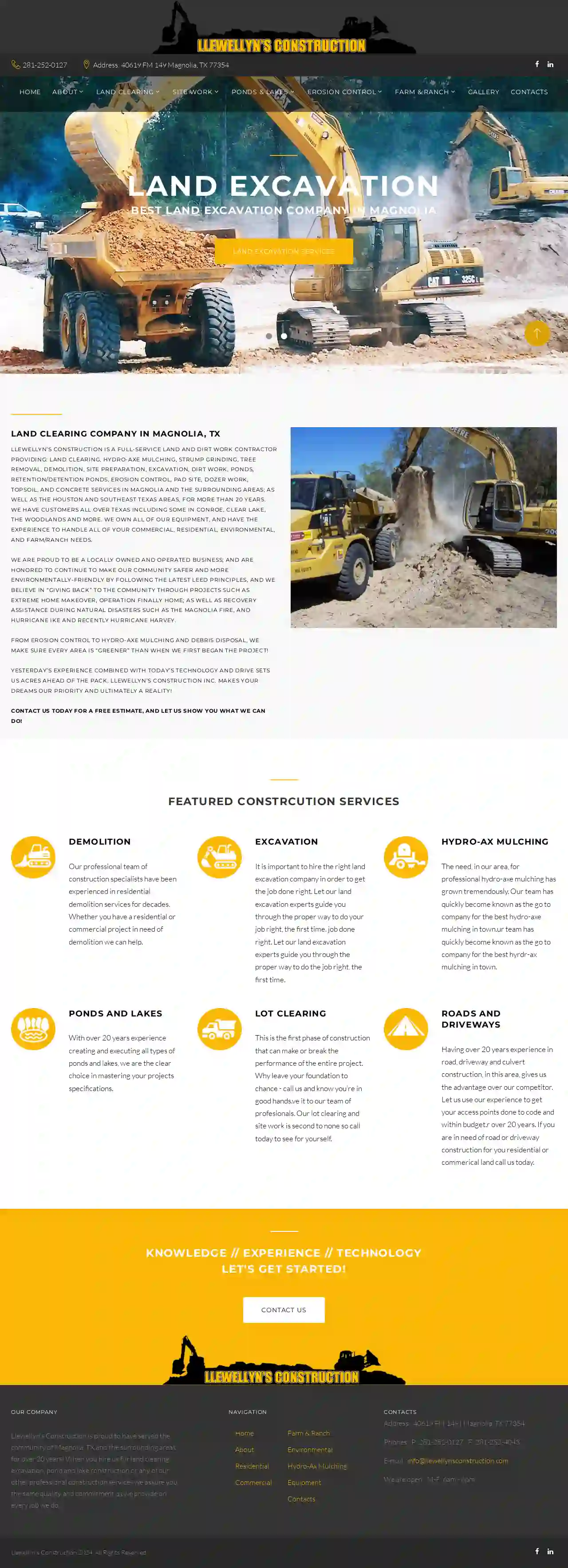
Llewellyn's Construction
4.25 reviews40619 FM 149, Magnolia, 77354, USLlewellyn's Construction: Your Trusted Partner for Land Clearing, Excavation, and More Founded in 1996 by John Llewellyn, Llewellyn's Construction has grown from a small "dozer" company to a trusted leader in all phases of earthwork for Montgomery, Harris, Walker, Waller, Grimes, and surrounding counties. We've built a reputation for quality, commitment, and exceeding customer expectations. We're proud to be a locally owned and operated business, committed to making our community safer and more environmentally friendly by following LEED principles. We also believe in giving back through projects like Extreme Home Makeover, Operation Finally Home, and disaster relief efforts. Our team of experts has the experience and technology to handle all your commercial, residential, environmental, and farm/ranch needs. We own all our equipment, ensuring we can deliver efficient and effective solutions for every project. From erosion control to hydro-axe mulching and debris disposal, we make sure every area is "greener" than when we first began the project! Llewellyn's Construction makes YOUR dreams our priority and ultimately a reality! Contact us today for a free estimate and let us show you what we can do!
- Services
- Why Us?
- Gallery
Get Quote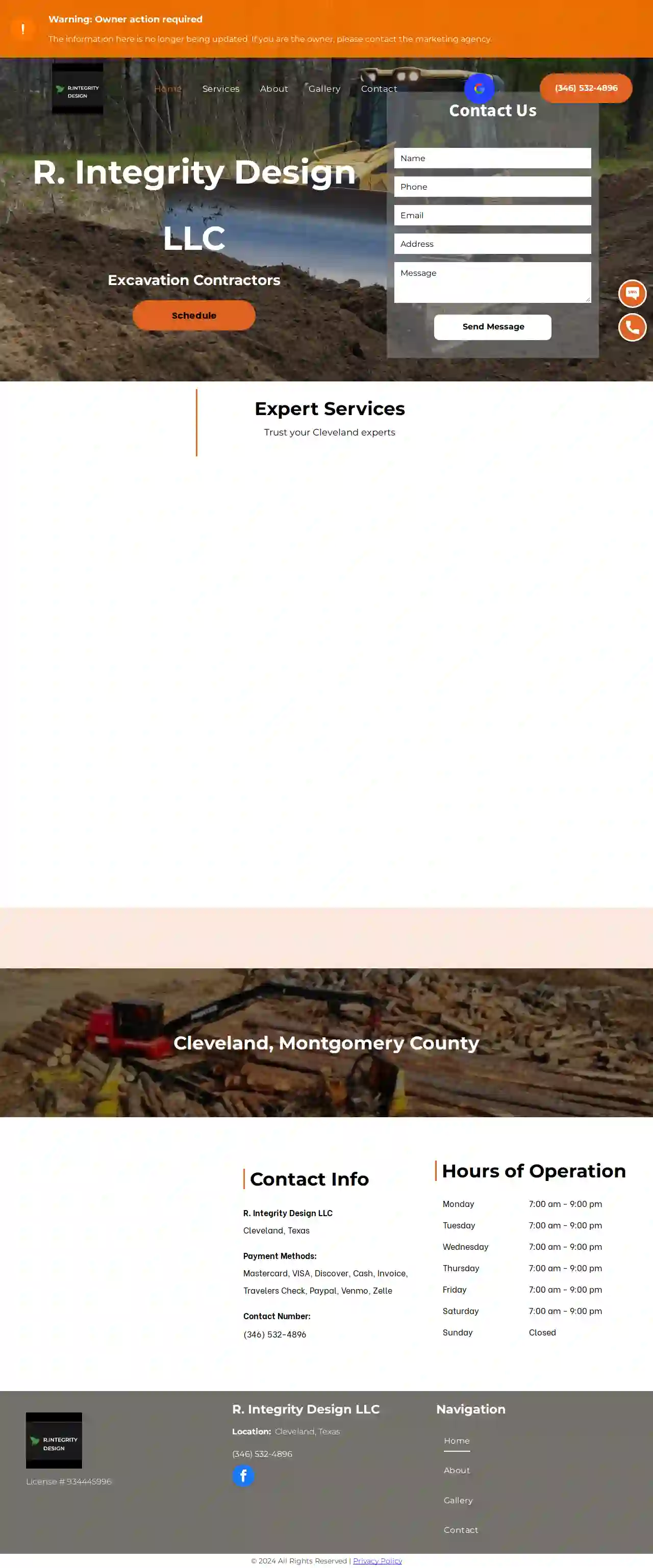
R. Integrity Design LLC
55 reviewsCleveland, Texas, USIntroducing R. Integrity Design LLC Are you looking for an experienced excavation contractor in Cleveland, TX? At R. Integrity Design LLC, our excavation services are rooted in a steadfast commitment to customer satisfaction. For over two decades, we have ensured that every project we undertake meets the highest standards of quality and safety. We understand the critical role that site preparation plays in any construction project, whether it's for a cozy home or a sprawling commercial complex. Our quick service doesn’t compromise on quality, and our reputation for great customer service is a testament to our client commitments. Our range of services is as diverse as our client base. From precise site clearing that paves the way for new beginnings to demolition services that carefully dismantle the old, we handle each task with unparalleled expertise. Our team excels in land demolition, clearing sites with efficiency and safety. We provide essential grading services like regrading and resloping to lay the ideal foundation for your construction. In construction demolition, we’re meticulous, ensuring precision in every phase. Our subgrade stabilization strengthens the base of your projects, and we’re adept at constructing retention walls, crucial for soil erosion and water flow control in civil constructions. Our work in specialized projects like railroad sighting, railroad yards, and railroad crossings showcases our versatility and ability to tackle complex tasks. We provide materials like gravel, crushed concrete, and limestone, integral to various construction phases. What sets R. Integrity Design LLC apart is our unwavering dedication to delivering exceptional service at great prices. We offer free estimates, ensuring transparency right from the start. For top-notch excavation services in Cleveland, TX, choose R. Integrity Design LLC. We're ready to bring your construction visions to life with our expertise. Reach out for a free estimate and discover why we're a go-to contractor in the industry. Together, let's create something outstanding.
- Services
- Why Us?
- Gallery
Get Quote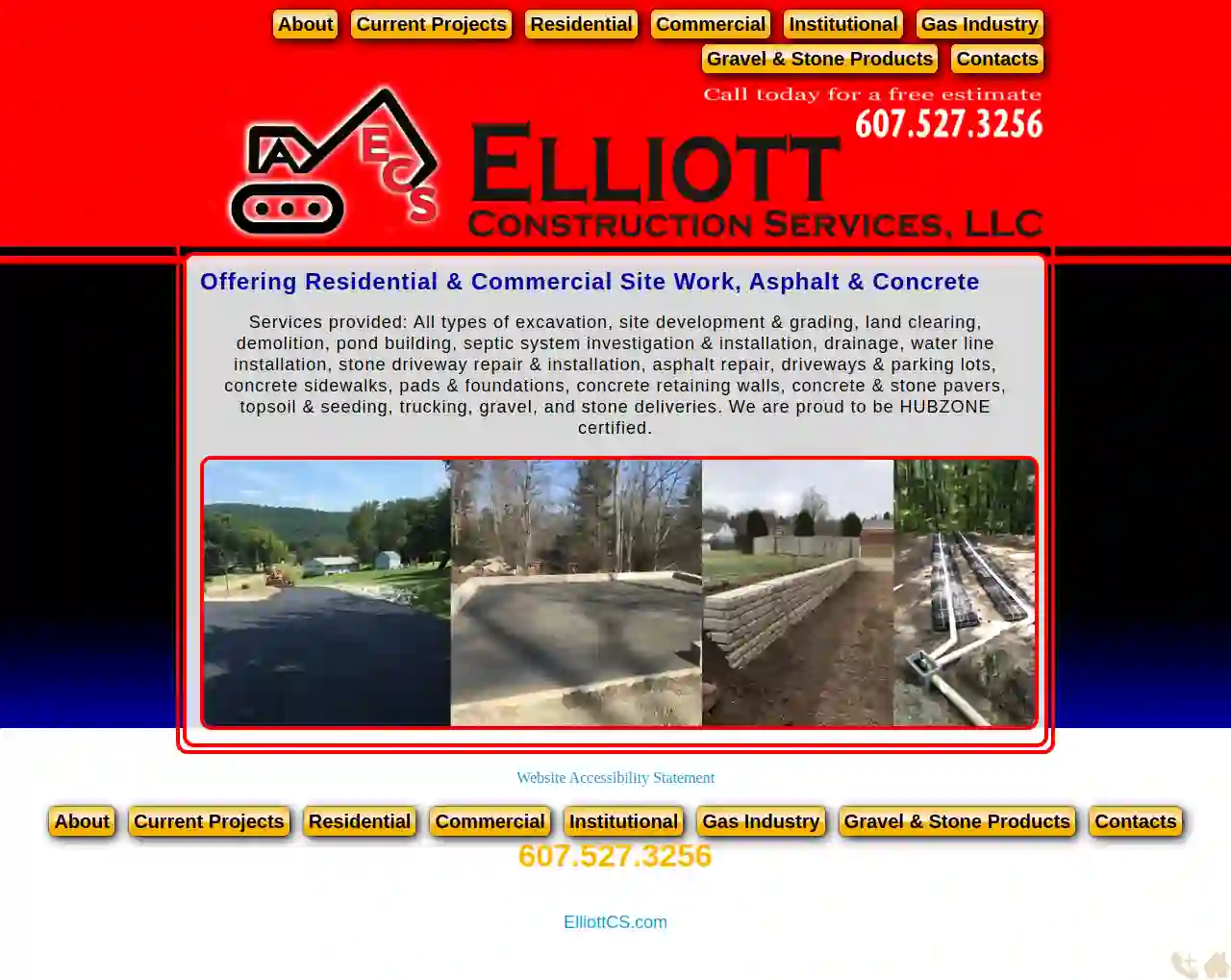
Austin Construction LLC
4.65 reviews5054 County Route 125, Campbell, 14821, USElliott Construction Services, LLC Elliott Construction Services, LLC is a HUBZONE certified company offering a wide range of services for residential, commercial, and institutional projects. We are located just minutes off of exit 41 on Interstate 86 in Campbell, NY, making us conveniently located for projects in the Southern Tier region of New York. Our team has extensive experience in all types of excavation, site development & grading, land clearing, demolition, pond building, septic system investigation & installation, drainage, water line installation, stone driveway repair & installation, asphalt repair, driveways & parking lots, concrete sidewalks, pads & foundations, concrete retaining walls, concrete & stone pavers, topsoil & seeding, trucking, gravel, and stone deliveries. We are committed to providing high-quality workmanship and exceptional customer service. Our team is dedicated to providing our clients with the highest quality services and exceeding their expectations. We are committed to safety, efficiency, and environmental responsibility in all our projects. We are proud to be HUBZONE certified, which allows us to provide competitive pricing and exceptional service to our clients.
- Services
- Why Us?
- Gallery
Get Quote
Fletcher Excavating Inc
53 reviewsWaco, US- Services
- Why Us?
Get Quote
Scoopz Excavation of Waco
51 reviewsWaco, 76712, USExcavation Contractor Waco We off the best commercial and residential excavation services to Waco and the surrounding areas. Call today for a free consultation! Excavation Contractor Waco Scoopz is the best excavation contractor Waco TX for all your land projects. Call us for commercial and residential professional excavation jobs. Our services include: excavation, land clearing, site prep, and bulldozing. Additionally, we build retention ponds, lakes and roads. Hire us in Waco TX for cedar clearing, underbrush mulching, and pasture restoration. No matter the size of the project, we provide excellent service and exceptional performance. As you will see, our team flawlessly executes every phase of construction. We are the #1 excavating contractor in Waco, Texas. Additionally, we server Killeen, Copperas Cove, Temple, Georgetown, Round Rock, New Braunfels and San Marcos. With over 20 years of experience, the quality of our teamwork separates us from the rest. Scoopz completes your land clearing and construction projects exceptionally and at competitive rates. Additionally, we handle every project using strategic planning and knowledge. Depending on your project needs, we customize our excavation services and processes to fit the construction or agricultural project requirements. Safety and Top Quality Work is Our #1 Priority We strictly adhere to all the highest safety standards for the excavation industry. The highly trained workers at Scoopz practice all current safety protocols. Therefore, we understand the importance of ensuring the worksite is absolutely safe. Not only for our own employees, but also for everything at the site. Witness first hand our commitment to top-quality excavating work and our dedication. Therefore, Scoopz Excavation of Waco provides quality work and a safe environment for every job. Click here to call for a free consultation!
- Services
- Why Us?
- Gallery
Get Quote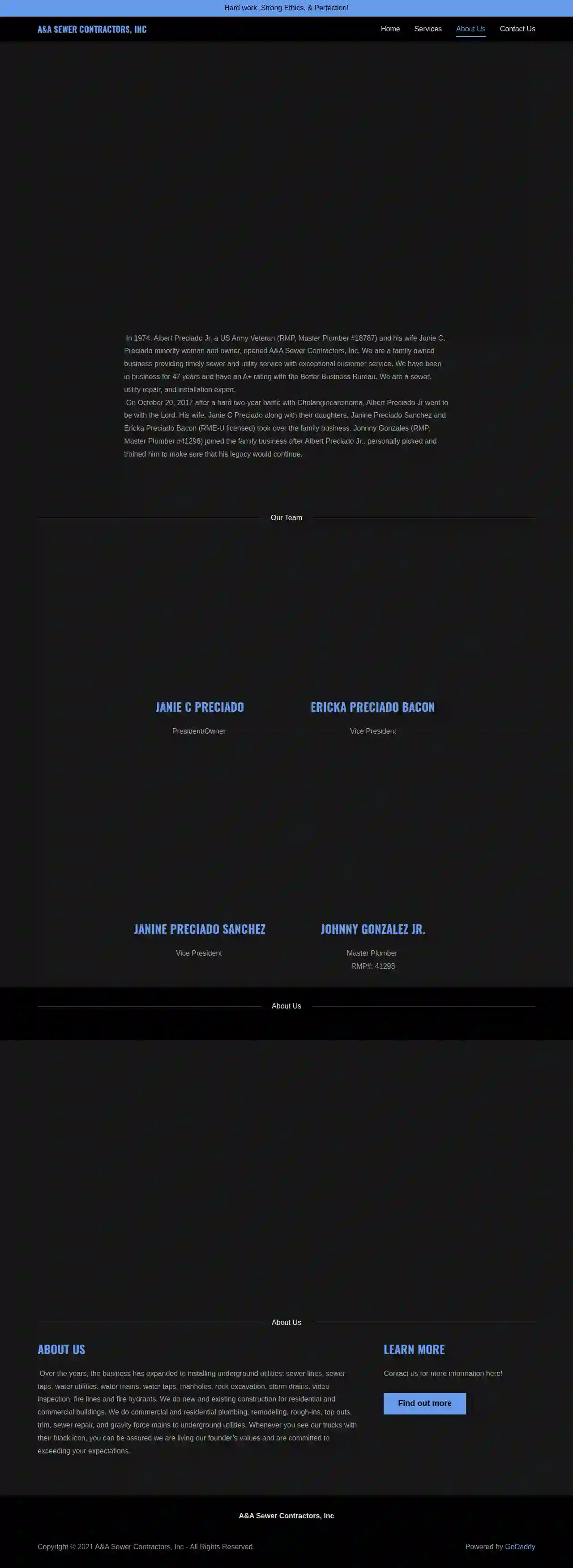
A & A Sewer Contractors, Inc. RMP #41298
58 reviews519 Montrose Street, San Antonio, Texas, 78223, USAbout Us Established in 1974 by Albert Preciado Jr., a US Army Veteran and Master Plumber, and his wife Janie C. Preciado, A&A Sewer Contractors, Inc. is a family-owned business dedicated to providing exceptional customer service and timely sewer and utility services. With over 47 years of experience and an A+ rating from the Better Business Bureau, we are your trusted experts for sewer, utility repair, and installation. Following Albert Preciado Jr.'s passing in 2017, his wife Janie C. Preciado, along with their daughters Janine Preciado Sanchez and Ericka Preciado Bacon, took over the family business. Johnny Gonzales, a Master Plumber personally chosen and trained by Albert Preciado Jr., joined the team to ensure the continuation of his legacy. Our Team Janie C. Preciado President/Owner Ericka Preciado Bacon Vice President Janine Preciado Sanchez Vice President Johnny Gonzalez Jr. Master Plumber RMP#: 41298 Over the years, A&A Sewer Contractors, Inc. has expanded its services to include underground utility installations such as sewer lines, sewer taps, water utilities, water mains, water taps, manholes, rock excavation, storm drains, video inspection, fire lines, and fire hydrants. We also provide new and existing construction for residential and commercial buildings, as well as commercial and residential plumbing, remodeling, rough-ins, top outs, trim, sewer repair, and gravity force mains to underground utilities. When you see our trucks with their black icon, you can be assured that we are upholding our founder's values and are committed to exceeding your expectations.
- Services
- Why Us?
- Accreditations
- Our Team
- Gallery
Get Quote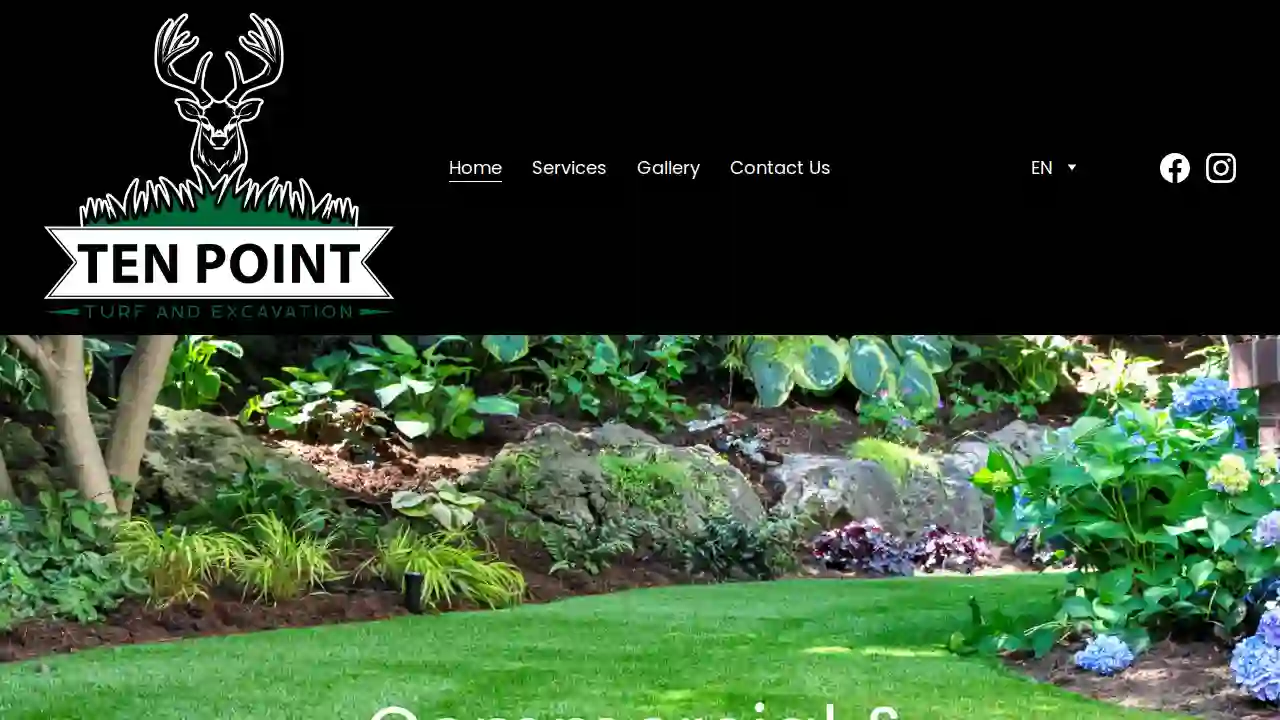
Ten Point Turf and Excavation LLC
57 reviewsPlano, USWelcome to Ten Point Turf & Excavation LLC, where we sculpt dreams into reality and ground into artistry. Over 15 years of experience with land leveling and other services. Our artificial turf installation and excavation service is more than just dirt and grass; it's the foundation of your vision. From precision excavation to lush, green landscapes, we dig deep to bring your projects to life! At Ten Point Turf & Excavation LLC, our mission is to provide high-quality artificial turf installation and excavation services to our customers, offering innovative solutions that enhance outdoor spaces and exceed expectations. With a commitment to professionalism, reliability, and customer satisfaction, we aim to transform landscapes with eco-friendly and sustainable practices, delivering long-lasting and aesthetically pleasing results.
- Services
- Why Us?
- Gallery
Get Quote
CONSTRUTEXAS, LLC
52 reviews1901 Nw Military Hwy Suite 104, San Antonio, 78213, USAbout us Construtexas is a Texas company that offers construction services in San Antonio and Central Texas area. Our partners have over 20 years of experience in the construction industry. Furthermore, we are committed to employing an experienced staff to provide a high level of quality and the best consumer service. We know that success is the result of opportunity plus preparation. We are prepared, just give us the opportunity to serve you.
- Services
- Why Us?
- Gallery
Get Quote
Central Michigan Contracting, Inc.
4.214 reviewsSpring, USMichigan’s Preferred Excavating Contractor Central Michigan Contracting (CMC) is a true “family business.” Working in the industry for 40 years and always working hard for somebody else Deena’s father, Dee, wanted his own company, his own dream. In 2000, Deena decided to “take the risk” and start CMC. Knowing her father and her brother, Bo, whom had also worked in the industry for 11 years prior, were fully capable of operating their own company all she had to do was get it started and that she did. Experienced in Jobs Big & Small Since the first project for the Isabella Drain Commission, CMC, has grown steadily every year thereafter. What started out with three employees 19 years ago has grown to more than 25 employees. All CMC operators are proud members of the Operating Engineer’s Local 324 and all laborers are proud members of LuiNA Local 1098. Collectively, employees have over 100 years of experience. No job is too big or too small! Highly Skilled Operators CMC is now an Operator Qualification (OQ) ready contractor. The OQ Training Program is provided by MEA Energy Association. CMC is also an ISNetworld Member Contractor. CMC is pre-qualified for the Michigan Department of Transportation in demolition, grading, drainage structures, aggregate construction, land clearing and grubbing, and underground utilities.
- Services
- Why Us?
- Our Team
- Gallery
Get Quote
Over 3,943+ Excavation Contractors registered
Our excavation experts operate in Killeen and surroundings!
ExcavationHQ has curated and vetted the Best Excavation Businesses arround Killeen. Find a reliable contractor today.
Frequently Asked Questions About Dirt Contractors
- Large-Scale Excavation: Assessing soil conditions, designing slopes, and ensuring stability for large excavation projects.
- Foundation Design: Determining the appropriate foundation type and depth based on soil bearing capacity and other factors.
- Retaining Walls: Designing retaining walls to stabilize slopes, prevent erosion, or create level areas on sloped sites.
- Slope Stability Analysis: Evaluating the stability of slopes and recommending measures to prevent landslides or erosion.
- Contaminated Soil Remediation: Developing and implementing plans to clean up contaminated soil.
- Erosion Control: Berms can intercept and slow down runoff, preventing soil erosion and sedimentation.
- Noise Reduction: Berms can act as noise barriers, reducing noise pollution from traffic, construction, or industrial activities.
- Visual Screening: Berms can block unsightly views, create privacy, or define property boundaries.
- Security: Berms can serve as security barriers, deterring unauthorized access or vehicle intrusion.
- Landscaping: Berms can enhance landscaping by creating elevation changes, providing planting areas, or defining garden beds.
- Clearly Define Your Project Scope: Provide the contractor with detailed information about your project, including the size of the area, the type and volume of dirt needed, the desired grading or leveling, and any specific requirements.
- Obtain Multiple Quotes: Request quotes from multiple reputable dirt contractors to compare prices, services, and experience. Ensure the quotes are comprehensive and include all project details.
- Verify Licensing and Insurance: Confirm that the contractor has the necessary licenses, insurance coverage, and a good safety record. This protects you from potential liabilities.
- Communicate Openly and Regularly: Maintain open communication with the contractor throughout the project, addressing any questions, concerns, or changes promptly. Regular updates and site visits can help ensure everything is on track.
- Document Everything: Keep written records of all communication, contracts, quotes, and invoices for reference and accountability.
- Designated Disposal Facilities: Contact your local waste management authority or search online for designated dirt and debris disposal facilities in your area. They accept various types of soil and construction materials.
- Recycling Centers: Some recycling centers accept clean fill dirt, concrete, or brick for reuse in other construction projects.
- Donation: If the dirt is clean and suitable for gardening or landscaping, consider donating it to community gardens, schools, or neighbors with landscaping projects.
What is a soil engineer, and when might I need one?
What is a dirt berm, and what are its uses?
What are some tips for working with dirt contractors?
What is the best way to dispose of excess dirt?
What is a soil engineer, and when might I need one?
- Large-Scale Excavation: Assessing soil conditions, designing slopes, and ensuring stability for large excavation projects.
- Foundation Design: Determining the appropriate foundation type and depth based on soil bearing capacity and other factors.
- Retaining Walls: Designing retaining walls to stabilize slopes, prevent erosion, or create level areas on sloped sites.
- Slope Stability Analysis: Evaluating the stability of slopes and recommending measures to prevent landslides or erosion.
- Contaminated Soil Remediation: Developing and implementing plans to clean up contaminated soil.
What is a dirt berm, and what are its uses?
- Erosion Control: Berms can intercept and slow down runoff, preventing soil erosion and sedimentation.
- Noise Reduction: Berms can act as noise barriers, reducing noise pollution from traffic, construction, or industrial activities.
- Visual Screening: Berms can block unsightly views, create privacy, or define property boundaries.
- Security: Berms can serve as security barriers, deterring unauthorized access or vehicle intrusion.
- Landscaping: Berms can enhance landscaping by creating elevation changes, providing planting areas, or defining garden beds.
What are some tips for working with dirt contractors?
- Clearly Define Your Project Scope: Provide the contractor with detailed information about your project, including the size of the area, the type and volume of dirt needed, the desired grading or leveling, and any specific requirements.
- Obtain Multiple Quotes: Request quotes from multiple reputable dirt contractors to compare prices, services, and experience. Ensure the quotes are comprehensive and include all project details.
- Verify Licensing and Insurance: Confirm that the contractor has the necessary licenses, insurance coverage, and a good safety record. This protects you from potential liabilities.
- Communicate Openly and Regularly: Maintain open communication with the contractor throughout the project, addressing any questions, concerns, or changes promptly. Regular updates and site visits can help ensure everything is on track.
- Document Everything: Keep written records of all communication, contracts, quotes, and invoices for reference and accountability.
What is the best way to dispose of excess dirt?
- Designated Disposal Facilities: Contact your local waste management authority or search online for designated dirt and debris disposal facilities in your area. They accept various types of soil and construction materials.
- Recycling Centers: Some recycling centers accept clean fill dirt, concrete, or brick for reuse in other construction projects.
- Donation: If the dirt is clean and suitable for gardening or landscaping, consider donating it to community gardens, schools, or neighbors with landscaping projects.